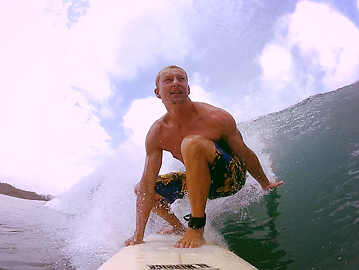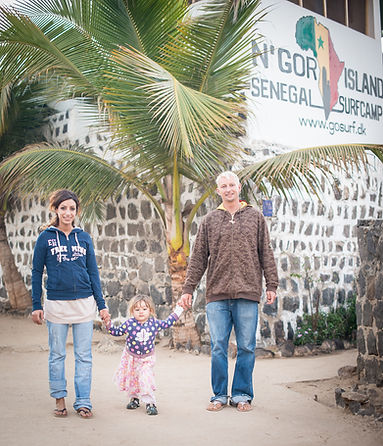
N'Gor Island Man
Jesper Mouritzen is the founder and owner of the world-class N’gor Island Surf Camp. Situated above the cliffs at N’gor right, the break famously explored in the 1966 film the Endless Summer, these surf houses are surely the best-situated in all of Dakar. As a friend and active supporter of the surf community here in Dakar, we caught up with Jesper with hopes of absorbing some of his local wisdom.
Hi Jesper, as one of the most knowledgeable surfers in the area, I’d love to hear about you getting rooted in N’Gor. When did you first come to Senegal and set up camp?
I came here in 2006 to come surf, and it was six years ago that I started the camp. For the first six years that I was here, actually, I didn’t sleep on the mainland once. I only slept on the island here for those years except when I would visit Denmark.
What was the surf scene like here when you first arrived?
There were very few locals here; most of the people in the water were ex-pats. The knowledgeable locals that were surfing when I got here are now employed and work for the camp. They guide and teach from the island here and around the Dakar coast.

Was it difficult to get the word out and attract guests?
Yeah, there were definitely some political issues that made it difficult at the time and then stories get blown up which leads to disrupting tourism. The internet has changed a lot, though, like the way potential guests learn about what’s happening in destinations through social media that lets people talk about and share pictures and experiences. This has helped a lot. Content can now reach and educate so many people so fast.
How do you think the growing surf scene could support the Dakar community at large?
Surfing can definitely create jobs and bring industry, but there has to be an emphasis on employing locals. N’Gor ISC employs 14 locals of Dakar and we bring in the most economic activity to the island. Restaurant owners and vendors ask me before the busy seasons, “When are guests coming?”
Tourism can be very beneficial, like in Morocco. I went to breaks that had nothing five years ago, but now, because of surf tourism, towns and growing villages are benefiting from accommodating traveling surfers. It can be sustainable if kept local.
What about traveling to Dakar to surf? What are your favorite aspects of this place?
The friendliest locals I’ve ever met. If they see you in the lineup and notice you haven’t been catching waves, they will tell you where best to drop from and wait for you to catch one. That rarely happens anywhere else.
And the surf?
Consistency. This past season, there was only one day in which there was no surf. With so many choices of breaks that work in so many conditions, it’s always good somewhere. The surf-tourism season peaks in the winter and most people think that’s when it’s good, but that’s only true if you’re here to ride 8+ foot waves. I actually think it’s better in the summer when the southern swell comes in and wraps into the west coast.

What’s one thing you’d want to see change in Dakar?
We’ve briefly talked about this in the past but trash. The way the city deals with its waste needs to change. You commonly see people go into a boutique, buy a soda that’s put into a plastic bag to take with them, throw the bag on the ground, drink their soda, then throw the bottle behind them on the ground. There has recently been a ban on plastic bags so things are changing from the top-down, but it’s the mind-set that has to change.
But in general, this place has the most generous and kind locals of anywhere I’ve seen. They are so laid back. Some people say “the French wear watches, but Africans have time.” I wouldn’t want that to change.
This discussion took place at N'Gor island on Nov 13, 2005. For more info, check out www.gosurf.dk/en/